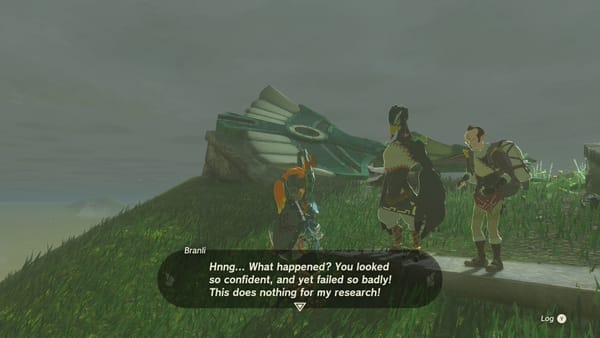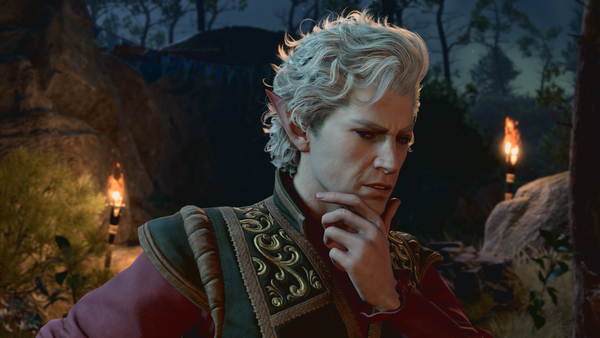#111: Breaking point
NFT evangelists insist global domination is imminent. The evidence suggests the opposite.
[Thanks for reading Hit Points! If this is your first time, then a hearty welcome to you. If you enjoy today’s edition, note that you can sign up for free to get this twice-weekly look at the latest goings on in the game industry sent straight to your inbox. It also gets you access to the full Hit Points archive. Thanks, and enjoy!]
To Ubisoft, then, and a chance to end the week with a merry dance on the grave of a widely reviled endeavour. We already knew that the publisher’s loudly trumpeted NFT project, Ubisoft Quartz, had not begun too well. Not only was there loud pushback from the player community and internal uproar from staff displeased by Ubi’s launch of NFT cosmetics for Ghost Recon Breakpoint; worse still, from the publisher’s perspective anyway, hardly anyone was buying the things and they were as good as worthless. Astoundingly it appears that trousers, emblazoned with serial numbers that neither the player nor their opponents can see, were not that hot a commodity.
Now Ubisoft has announced that it is ending support for Breakpoint, rendering the game’s NFTs even more worthless than they already were. This is quite the change of heart from a company whose blockchain chief promised in January that Ubisoft was “seeing the endgame”, which was “about giving players the opportunity to resell their items once they’re finished with them, or they’re finished playing the game itself.” Did Nicolas Pouard know that the actual endgame for Breakpoint was mere weeks away when he said that? Ubisoft is putting a bold face on it all, saying in a statement that it “will now look to continue our exploration by improving the value proposition of the [Quartz] platform with new projects and features.” Not the best time to be talking about ‘value proposition’, if you ask me — not when you’ve just made something that was already effectively worthless actually worthless — but do carry on.
This whole mess exposes the broader folly of established game companies moving in on the NFT grift, and not just because of the strength and volume of pushback they will inevitably receive from players and staff. Breakpoint’s NFTs, for all the uproar they caused, only ever sold for what if we might charitably call a pittance. And Ubisoft’s experience should sound an alarm to its peers that, while there is clearly an enormous amount of money flying around in the blockchain space, it is small potatoes in the grander scheme of things. Ubisoft, and the other big publishers, think in millions, if not tens of them — in terms of sales revenue, player counts, pre-orders and all that. Despite all the fuss, all the high-profile sort-of-well-not-really success stories and the colossal amount of investment going on, blockchain gaming remains kind of small-time. Yes, evangelists will tell you that’s going to change. But the available evidence tells a very different story.
This week crypto cheerleader Coindesk revealed that flash-in-the-pan play-to-earn ‘sensation’ Axie Infinity had seen its daily average users fall by 30% in a month, to about 107,000. The Sandbox, a metaverse game-thing whose tyres Hit Points witheringly kicked when its alpha rolled out last November — and whose makers raised $93m in a funding round timed smartly to coincide with launch — saw a 29% drop in average users in 30 days. The game’s new DAU figure, and I promise I am not making this up, is 1,180. Hit Points is bigger than that! Hilariously, The Sandbox’s head honcho was this week publicly mulling another funding round, but dismissed talk of taking the company public through an IPO. “Let’s talk again in a few years,” he said. Ha, yes. Let’s.
Still the VC community marches on, undeterred by the reality before it. This week it is excitedly crowing about the 220k users drawn to the newly launched Axie Infinity spin-off Axie Origin. The consistently crypto-bullish Andreesen Horowitz has led a funding round in a web3 game studio called Battlebound, coining a new buzzword, “play and earn”, in the process. (As always, Partridge has the perfect retort). It’s also backing a new metaverse company spun out of Improbable, maker of the cloud computing platform SpatialOS, which has been floating around for years and has so far yielded a raft of cancelled games, a sale of an internal studio to Tencent, and a quietly successful side-hustle in making military simulations for western governments.
I suppose the law of averages dictates that one day, one of the legion of blockchain-y projects at which the VC community is throwing such unfathomable amounts of money will break through. Monkeys and typewriters, and all that. But the tea leaves don’t look all that great at the moment — and with each passing week, they manage to look even worse. I am increasingly confident that the revolution, when it comes, will not be tokenised. Nice to end the week on a positive note, isn’t it.
MAILBAG!
“Great piece,” writes recent Max HP subject David Polfeldt in response to Monday’s Hit Points, before spending several hundred words explaining, with typical politeness, why I am wrong. “In most games today, the AI-enemy is reduced to what I would call a Response Robot. They have a set of predetermined behaviours which are activated by specific triggers. A player who wants an interesting solo experience will soon detect the pattern and before they know it, they are playing the pattern rather than the game. A gamer quickly detects the triggers (distance/noise/opening-of-doors/light/fire/etc) and they quickly learn which AI behaviour each one provokes. Soon, they are gaming a predictable system.
“When players ask for better AI, they mean something richer, something that is more like life itself (e.g. multiplayer games): a greyscale of unpredictability, a mix of good and bad decisions. An AI that is willing to take the occasional (pattern-breaking) risk, and most importantly an AI that learns. Once you beat a human opponent in the same way more than three times, they will begin exploring alternative strategies. Just like a human, a ‘better AI’ shouldn’t necessarily be good at all its choices, but it should be making them.” Very nice. He also said some stuff about Elden Ring which I have printed off and set fire to, because I don’t want him getting cancelled.
- Ferruccio, a game designer, weighs in on difficulty. “Big games these days are playtested to death,” he writes. “And when you get report over report that x% of players have issues in this part of the game, the temptation to just fix it is strong. But if you do, the end result is something like Forbidden West, in which every little bump has been levelled and the game won't let you take ten seconds to think before the character says what you need to do. I am not saying Forbidden West is a bad game, but for sure it feels less special and brilliant than something like Elden Ring.” I haven’t even started Horizon, and I suspect I never will. That series is cursed; I didn’t play the first because I’d just finished Breath Of The Wild, which made all other open-world games feel pointless for a while. Now along comes the sequel and Elden Ring has done it again.
MORE!
- Returnal was the big winner at last night’s gaming BAFTAs, picking up four gongs including Best Game. Hit Points’ beloved Unpacking took home three, which is just lovely.
- Riot Games is instructing US workers to return to the office, and has cancelled mandates covering vaccination and face masks. The news follows a similar kerfuffle at Activision Blizzard. In these companies’ defence (gasp!) they are following government guidance. It’s really just a reflection of the fact that our elected leaders are wishing the pandemic away because they don’t want to pay for it anymore, and are delegating responsibility for it to business owners, who in turn pass it on to their employees. Still, it’s a brave move for a company to make amid the Great Resignation. If I ran a big games firm I’d be exploring what a 100% remote policy could do for my recruitment strategy, but obviously I don’t, so never mind.
- Speaking of Activision, the publisher is putting all temporary QA staff on full-time contracts, with a pay rise — except for the cohort at Raven which formed a union. Raven says it is unable to match the offer “due to our legal obligations under the National Labor Relations Act.” I will never quite understand why American companies are so weird about unions. One for next week’s MAILBAG!, perhaps.
- Somewhere on a whiteboard, sometime in the recent past, someone wrote on a whiteboard: “What if Roblox, but good?” The result: Lego and Epic Games are partnering to build a child-friendly corner of the Metaverse.
- Saudi prince Mohammed Bin Salman now owns 96% of SNK. Would advise maybe not going to any of their press events for a bit. (Sorry, trying to delete it.)
- Remedy is remaking the first two Max Payne games for Rockstar. I like Remedy and have pals over there but I worry a bit about them overextending themselves — a fear hardly assuaged by the recent launch of that Crossfire disaster.
- I enjoyed this Twitter thread about how to effectively demo games to press at conventions. In my experience indies are instinctively pretty good at this; I have never played more games in so short a period of time as I did at PAX East a few years back. The big publishers always seem to want to have a marketing manager read you a PowerPoint deck first.
You’re all caught up! A note for new, or new-ish arrivals: now you’re signed up you have access to the full Hit Points archive, which you can read in a web browser at your leisure. There’s someone going through them all at the moment, reading a few a week and clicking the like button on most of them and every time I get the notification email my heart soars. I see you, Paddy, and thank you, whoever you are.
Gosh, I’m ever so ready for the weekend, even though they’re rarely too relaxing these days. Have a great one, do the thing with the buttons below (one of them is new! I have no idea how it works!) and I’ll see you all next week.





